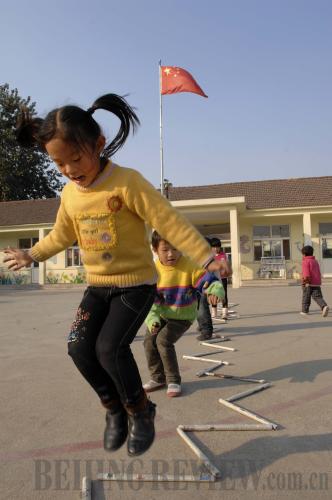|
 |
|
PLAY TIME: Children of migrant workers in a kindergarten in Qingdao, Shandong Province, have a sports class (GUO XULEI) |
Less Harmful Ban
As 78 centrally administered state-owned enterprises whose major business does not include real estate development, are very reluctant to retreat from the property sector in accordance with an order of the Central Government, the banking regulator has banned commercial banks from providing loans for their new real estate programs.
With the credit ban, the banking regulator means to cut the cash chain for the enterprises carrying out real estate development on the sideline. We do not doubt the positive effect of this policy. But the extent to which this ban will help to rein in these enterprises is quite uncertain.
Bank loans and presale incomes of commodity houses are the major sources of capital for real estate developers. After years of a housing boom, however, many property companies are already very strong. They depend less and less on bank loans for business operations.
At present, centrally administered enterprises need to contribute at most only 10 percent of their profits to the state. Even if the proportion was raised to 30 percent, some enterprises would still have sufficient cash at hand for business expansion. Meanwhile, a large amount of speculative money is waiting to enter China's property market.
Meanwhile, in some regions, centrally administered enterprises are provided with preferential policies by local governments who won't like their leaving.
Based on these facts, it's hard to say whether the credit ban will work or not. Maybe tougher measures such as a specific deadline are necessary. Those who are still in the real estate business by the deadline should be severely punished.
China Youth Daily
Not Cooling Down Yet
On December 5, 1.03 million people took part in this year's national civil service examination, a drop of 10,000 participants compared to last year. For the first time in many years, the frenzy to take the examination for civil service posts has cooled down a bit.
Sources with the State Bureau of Civil Servants explain: First, China's recovering economy is providing people with more job opportunities; second, more people are showing reason about the rush to sitting in the examination; and third, 85 percent of government departments are demanding candidates have at least two years' work experience, which has disqualified many new college graduates.
In fact, the ratio of examinees to successful admissions is still as high as 63.6 to 1 on average and 4,961 to 1 for the hottest position. It's still hard to say civil service posts are becoming less attractive.
Why? It's because people believe these posts are privileged and well paid. More importantly, their holders can have almost all their livelihood needs paid for by the state, which is a big contrast to the majority of other professions.
Whether a cooling down is really happening depends on effective restriction of civil servants' privileges and accelerated reforms of income distribution, in order to enable people to believe that even if they are not civil servants, a decent and affluent life is still readily available.
The Beijing News
Rational Relocation
The Shaanxi Provincial Government decided on December 6 the province would start to move dwellers out of impoverished mountainous regions from next year, in hopes of enabling them to avoid threats from geological disasters. The two major relocation programs will involve 2.4 million and 392,000 people, respectively.
The impact of the catastrophic landslide in Zhouqu County in northwestern Gansu Province this August remains strong. That disaster killed 1,500 people and caused huge economic losses. Such losses can be avoided.
The history of human development shows mankind's choice for habitats is an increasingly rational process: safe geological and water conditions, fertile land and convenient transport. There are already many examples of large-scale migration and relocation in the Chinese history. Sometimes, it was not because of geological reasons, but because people were attracted to friendlier living environments, indeed sometimes sticking to one place, even when it was not so suitable for living.
Of course, in the process of such large-scale relocation, reasonable settlement planning and various support measures must follow up, so the displaced residents will feel the tangible benefits of the relocation.
China Youth Daily
Deeds, Not Words
A national teleconference on preschool education was held in early December. It was decided at the conference the government would increase policy and financial incentives to private kindergartens so they can reduce the fees charged to the level of their public counterparts.
A recent document of the State Council, China's cabinet, highlights the importance of increasing financial input in and expanding resources available for preschool education, which is the key to making education easier for the public to access. China's current input in preschool education accounts for only 1.3 percent of the total education budget. The international level is 3.8 percent and in some developed countries, the proportion reaches 11 percent.
Despite the pledge of "all kinds of policy and financial incentives," in the absence of detailed and specific measures in support of preschool education, it's impossible to cut tuition fees in private kindergartens.
Other concerns remain to be addressed. They include: Is it possible for kindergartens attached to government departments, public service institutions and big enterprises to be opened to the public? What kind of management modes will private kindergartens adopt after they receive subsidies from the government? Simply put, in realizing the goal of providing easy access to kindergartens to all children of preschool age, empty words are useless.
The Beijing News | 